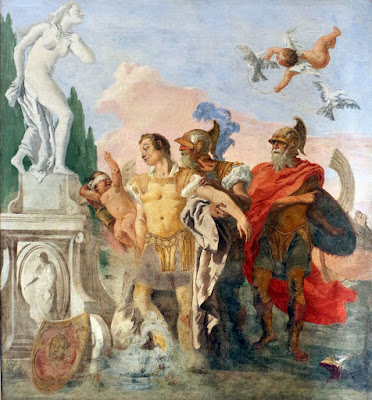 |
| Giandomenico Tiepolo Head of a Philosopher ca. 1758-64 oil on canvas Art Institute of Chicago |
 |
| Giandomenico Tiepolo Head of a Philosopher (detail) ca. 1758-64 oil on canvas Art Institute of Chicago |
 |
| Giandomenico Tiepolo Head of a Magus ca. 1757-59 oil on canvas Palazzo Pretorio, Prato |
 |
| Giandomenico Tiepolo Head of a Magus ca. 1757 oil on canvas Toledo Museum of Art, Ohio |
 |
| Giandomenico Tiepolo Marriage of Frederick Barbarossa and Beatrice of Burgundy ca. 1752-53 oil on canvas (after Tiepolo fresco in Würzburg) National Gallery, London |
 |
| Giandomenico Tiepolo Rebecca at the Well 1751 oil on canvas Musée du Louvre |
 |
| Giandomenico Tiepolo Widow of Darius supplicating Alexander the Great ca. 1750-53 oil on canvas Detroit Institute of Arts |
 |
| Giandomenico Tiepolo Rinaldo before the image of Armida (scene from Gerusalemme Liberata) ca. 1791 detached fresco (from Villa di Zianigo) Ca' Rezzonico, Venice |
 |
| Giandomenico Tiepolo Holy Family with Saint 1749 detached fresco (from Cappella di Zianigo) Ca' Rezzonico, Venice |
 |
| Giandomenico Tiepolo Golgotha ca. 1750-60 oil on canvas Museum Boijmans Van Beuningen, Rotterdam |
 |
| Giandomenico Tiepolo Descent from the Cross 1772 oil on canvas Museo del Prado, Madrid |
 |
| Giandomenico Tiepolo Lamentation at the Foot of the Cross ca. 1750-60 oil on canvas National Gallery, London |
 |
| Giandomenico Tiepolo Punchinellos in Cavalcade 1791 detached fresco (grisaille) Ca' Rezzonico, Venice |
 |
| Giandomenico Tiepolo Dance in the Country ca. 1755 oil on canvas Metropolitan Museum of Art, New York |
 |
| Giambattista and Giandomenico Tiepolo Meeting of Anthia and Habrocomes (scene from The Ephesian Tale by Xenophon of Ephesus) ca. 1743-44 oil on canvas Gallerie dell'Accademia, Venice |
"Giandomenico Tiepolo (1727-1804) was one of nine children of the great 18th-century Venetian master Giambattista Tiepolo (1696-1770). He spent the first half of his life by his father's side, assisting him with commissions as they travelled across Europe together. Domenico worked with his father on the interior decorative schemes for the Würzburg Residence and Villa Valmarana near Vicenza, as well as a spectacular series of trompe l'oeil frescoes for the throne room of Charles III at the Royal Palace in Madrid. By the 1740s, the younger Tiepolo had also begun making his own work, often on biblical themes. But it was after 1770, when his father died in Madrid, that Domenico's art came into its own."
– profile from Christie's sale catalog, July 2020